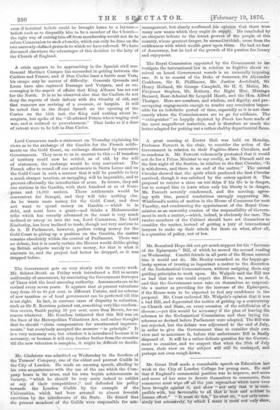A great meeting at Exeter Hall was held on Monday,
Professor Fawcett in the chair, to consider the action of the Government in relation to their Fugitive-Slave Circulars, and to condemn it. Mr. Fawcett vehemently protested that it would not do for a Prime Minister to say coolly, as Mr. Disraeli said on the first night of the Session, in relation to the first Circular, "It is withdrawn, and there is an end of the matter." The second Circular showed that the spirit which produced the first Circular survived, though it was subdued by the outcry against it. The proposal to receive a slave on our ships if his life is in danger, but to compel him to leave when only his liberty is in danger, Mr. Fawcett severely condemned, and the meeting, agree- ing with him, passed resolutions strongly supporting Mr. Whitbread's notice of motion in the House of Commons for next Tuesday, and condemning the appointment of the Royal Com- mission as an unworthy evasion of the responsibility of Govern- ment in such a matter,—which, indeed, is obviously the case. The twelve members of the Cabinet should have set themselves to consider the matter, instead of getting a jury of international lawyers to make up their minds for them on what, after all, is a question of policy, not of law.


































 Previous page
Previous page